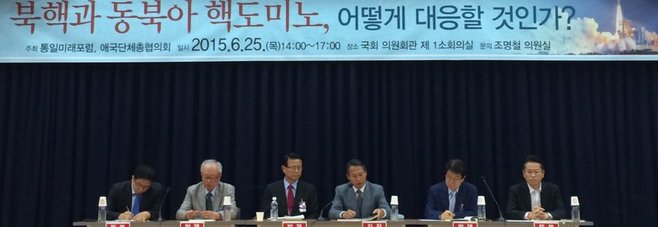 Image: Daily NK |
South Korea should develop nuclear weapons
to defend itself from the threats of North Korea, asserted a group of
professors at a seminar in Seoul focused on North Korea’s nuclear weapons capabilities
and the ramifications for neighboring countries in the region.
Hosted by the Unification Future Forum and
Liberty Club, the conference sought to raise the level of constructive discourse
on a divisive topic for both regional security issues and their implications for the broader international community.
“When we say that we should develop nuclear
weapons, we are not saying that we should wage a nuclear war — we are saying
we should protect ourselves from nuclear threats,” said Song Dae Song, a
professor at Konkuk University. “To have no nuclear weapons of our own while
North Korea is developing nuclear weapons is analogous to crafting weapons with
stones while a neighbor is threatening us with guns.”
In accordance with the Mutual Defense
Treaty, ratified in 1953 between the Republic of Korea and the United States,
South Korea sits under the U.S.’s nuclear umbrella, a term referring to a
guarantee by a nuclear weapon state to defend a non-nuclear allied state.
However, Park Jung Soo, the head of Liberty Club,
declared that the purported protection offered as part of this nuclear umbrella is far from
guaranteed. “Article III of the Mutual Defense Treaty stipulates, ‘each Party…would act… in accordance with its constitutional processes,’” he said,
explaining that in effect, this means that the U.S. would need public and
governmental approval.
Convincing a war-weary populace that
intervention is the proper course of action could prove exceedingly difficult
and spur significant backlash, rendering the nuclear umbrella an insecure,
incomplete arrangement, he claimed.
Park went on to quote Robert M. Gates, the former U.S. Secretary General, who, in the aftermath of military intervention
in both Iraq and Afghanistan, said, “Any future defense secretary who advises
the president to again send a big American land army into Asia or into the
Middle East or Africa should have his head examined.”
Park asserted that since the Iraq War, the
American public at large has become reluctant to militarily intervene in
foreign countries, weakening the ironclad guarantee associated with the nuclear umbrella.
He buttressed this argument with
Charles de Gaulle’s decision to push rapidly forward with France’s nuclear deterrent,
doubting that the United States would risk attack on its major cities solely to
save others in far flung areas across the globe.
“That is why France conducted its first
nuclear test in 1960 and is now a nuclear state despite being an ally of the
United States,” Park explained.
While Park conceded that many fear the
development of nuclear weapons in South Korea could jeopardize South Korea’s
diplomatic ties with the U.S., China, and a host of other countries, national
interests should remain at the forefront of such decisions.
“Why should we have to be so concerned
about how other countries will react when national defense is a basic factor in
a state’s autonomy? We are currently so dependent on a foreign country, namely
the United States, for national defense, which is indispensable for the very
existence of our nation,” he pointed out.
Lee Choon Gun, the head of the Korea
Institute for Maritime Strategy, thinks that South Korea’s nuclear development
will not actually evoke any criticism from the United States.
“The United
States is against its ‘enemies’ having nuclear weapons, but it is not against
its allies having them,” he asserted.
By way of example, Lee brought up Israel,
noting that despite the fact that the Israel’s nuclear program has been an open
secret since 1986, the official Israeli position is still never to confirm or
deny its existence.
He posited that Israel was able to develop
nuclear weapons because the U.S. overlooked its ally’s production of the
weapons. In fact, Lee maintains that the U.S. might actually prefer a
nuclear-equipped South Korea, claiming that this could keep China’s meteoric
rise in check while countering frequent threats from the North.
Still, many believe that if each of the
Koreas possessed nuclear weapons, it would place both in the fast lane toward mutual annihilation. Lee, however, finds this argument unfounded and unrealistic.
“The
only thing that can prevent a nuclear war is a nuclear weapon,” he said, going
on to draw parallels with Pakistan and India.
“These countries are at conflict
and both developed nuclear weapons because of each other; were they
annihilated? No. They cannot fight with one another because they know that the
other side has nuclear weapons.”
South Korea, Lee added, would completely
jettison diplomatic leverage if North Korea and China both possessed nuclear
weapons while South Korea lags behind without. It would be “too late” at this point for South Korea to set about attempting to rectify these issues, paralyzing the nation.

















